全球化英语课件
- 格式:ppt
- 大小:3.24 MB
- 文档页数:27
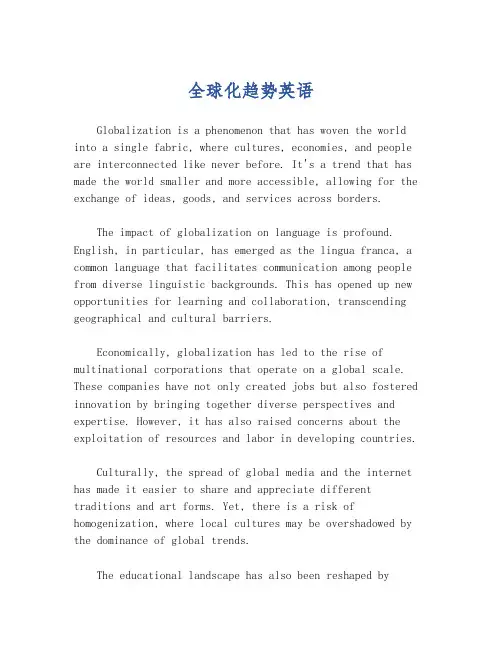
全球化趋势英语Globalization is a phenomenon that has woven the world into a single fabric, where cultures, economies, and people are interconnected like never before. It's a trend that has made the world smaller and more accessible, allowing for the exchange of ideas, goods, and services across borders.The impact of globalization on language is profound. English, in particular, has emerged as the lingua franca, a common language that facilitates communication among people from diverse linguistic backgrounds. This has opened up new opportunities for learning and collaboration, transcending geographical and cultural barriers.Economically, globalization has led to the rise of multinational corporations that operate on a global scale. These companies have not only created jobs but also fostered innovation by bringing together diverse perspectives and expertise. However, it has also raised concerns about the exploitation of resources and labor in developing countries.Culturally, the spread of global media and the internet has made it easier to share and appreciate different traditions and art forms. Yet, there is a risk of homogenization, where local cultures may be overshadowed by the dominance of global trends.The educational landscape has also been reshaped byglobalization. Students now have access to a wealth of knowledge and resources online, enabling them to learn from the best institutions worldwide. This has democratized education to some extent, but it has also highlighted the digital divide between the developed and developing worlds.In conclusion, globalization is a complex and multifaceted trend that has both positive and negative implications. It is essential to navigate this trend responsibly, ensuring that it benefits all people and preserves the rich tapestry of our global community.。
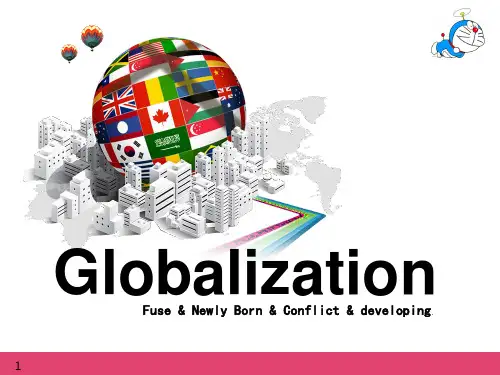
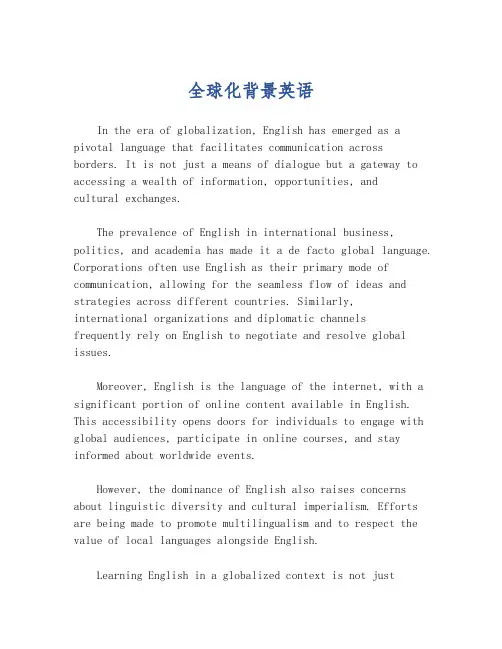
全球化背景英语In the era of globalization, English has emerged as a pivotal language that facilitates communication across borders. It is not just a means of dialogue but a gateway to accessing a wealth of information, opportunities, andcultural exchanges.The prevalence of English in international business, politics, and academia has made it a de facto global language. Corporations often use English as their primary mode of communication, allowing for the seamless flow of ideas and strategies across different countries. Similarly,international organizations and diplomatic channelsfrequently rely on English to negotiate and resolve global issues.Moreover, English is the language of the internet, with a significant portion of online content available in English. This accessibility opens doors for individuals to engage with global audiences, participate in online courses, and stay informed about worldwide events.However, the dominance of English also raises concerns about linguistic diversity and cultural imperialism. Efforts are being made to promote multilingualism and to respect the value of local languages alongside English.Learning English in a globalized context is not justabout mastering grammar and vocabulary; it's about understanding the nuances of communication that come with cultural awareness. It's about being able to express oneself clearly and to interpret the diverse perspectives that the language brings with it.In conclusion, English plays a crucial role in the interconnected world we live in. It is a tool for global participation, a bridge for cultural understanding, and a key to unlocking opportunities in a globalized economy. As we continue to navigate the complexities of a globalized society, the importance of English is likely to remain undiminished.。
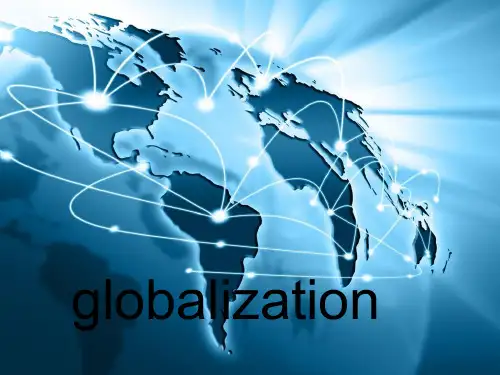

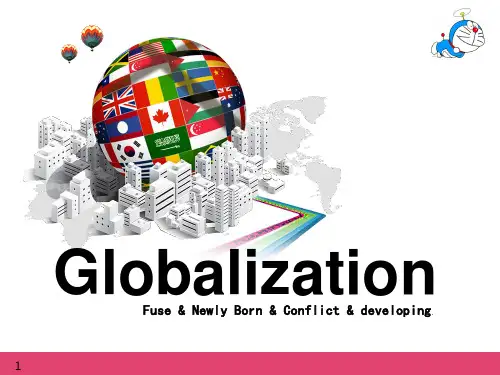

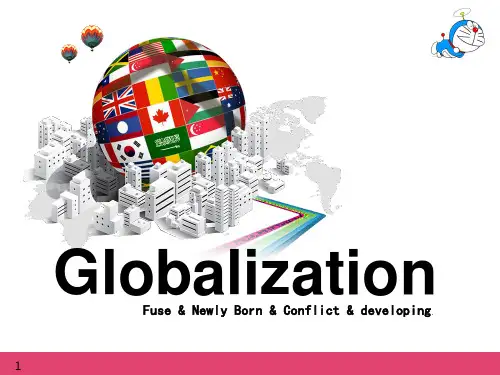
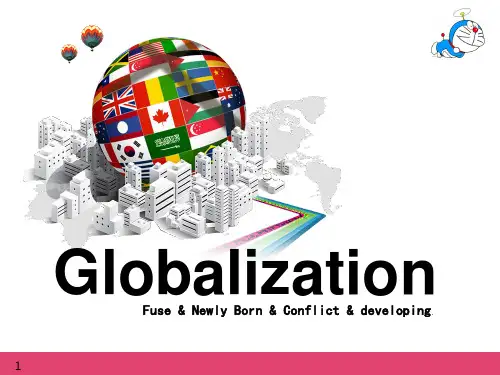
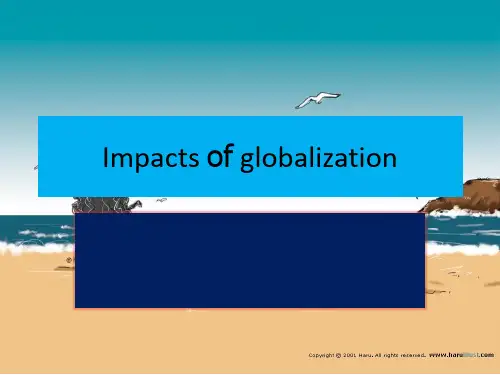
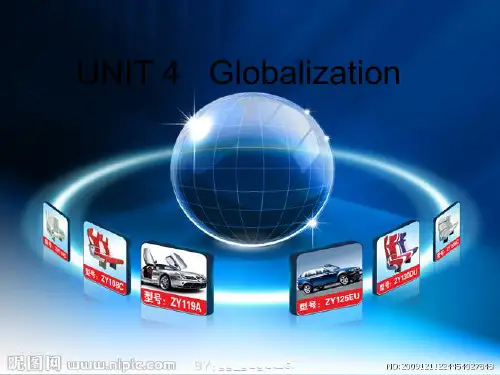
全球化战略英语Globalization is a strategy that business andorganizations use to create value and increase efficiency and effectiveness in the global marketplace. It involvesleveraging resources from around the world, enablingcompanies to capitalize on the best opportunities in any market. A globalized strategy requires companies to form international teams of managers and employees that spanmultiple countries and cultures.At the heart of this strategy is the need fororganizations to think beyond traditional boundaries, be open to new markets, cultures, and technology, and focus onbuilding relationships across borders. Companies must bewilling to accept differences in culture, language, and communication styles while still creating cohesive strategies. To ensure success, companies must also reinforce commonvalues and behaviors across their organization, irrespectiveof location.In order to develop a strong globalized strategy, companies must first assess their current global capabilities. This includes assessing existing resources, determining risk factors, and assessing local trends or events in target markets. Companies must then identify the most efficient and cost-effective approach to achieving their global goals, such as utilizing local resources or establishing a presence in multiple countries.To implement a successful strategy, companies must ensure that all stakeholders are aware of its goals and how they fit into the organization’s overall objectives. Companies shouldalso create a comprehensive training program to ensure that all employees understand the strategic objectives and how to achieve them.When implementing a globalized strategy, companies must also consider the legal implications of their activities. International business laws and regulations vary from country to country and companies must ensure that they remain in compliance with the local laws and regulations. Companies must also keep up to date with the latest changes and developments in different countries to ensure that their activities remain in line with any new regulations or laws.Globalization is an important strategy for businesses of all sizes and industries today. By taking advantage of resources and markets around the world, companies can increase their efficiency and effectiveness and boost their bottom line. With the right strategy and execution, globalizing can help organizations create successful strategies to reach their global goals.。
LOGO GlobalizationContentsWhat is the Globalization?Globalization in our lifeThe advantages and disadvantages of globalization what measures should be taken?Conclusion1、what is globalization?Globalization is a concept, but also a phenomenon of the development of human society.The usual sense, globalization is a growing, global linkages human life on a global scale on the basis of development and the rise of global awareness.Between countries in the political, trade and economic interdependence,globalization can also be interpreted as a compression of the world and the world as a whole.The pecific performance ofGlobalizationEconomic globalization is the worldeconomic activity beyond nationalborders, foreign trade, capital flows,technology transfer, provide services,interdependent, interrelated worldwidethe organic economy as a whole. Two mainfieldsEconomyCultureCultural globalization meanseverything in the world ofculture in various ways,"integration" and "differ" underliquidity on a global scale.2、Globalization in our lifePeople may drive to work in a car designed in Europe, assembled in South America, manufactured in Asia, and shipped by a Middle Eastern company.Sometimes depending on our dining preferences we may eat Italian pizza, korea roast, western beefsteak, the Mcdonald’s and so on near our school .As for entertainment flat screen televisionsmanufactured in Japan,the Apple iPod andiPhones , the SonyPlayStation, hp ,dellcomputers havebecome some of themost popular foreignbrands in our life.Once enteringDecember ,we areexpecting the comingChristmas and wondering how wonderful that daywill be .In our mind, thewestern festivals,such as valentine’sday ,Christmas,thanksgiving day ,have rooted deeply,and even becomemore impressing thansome of ourtraditional holidays .phenomena in our life? ——That is what is called globalization.countries joining together economically, through education, culture and politics making everything and everyone similar or even identical.3、The advantages and disadvantages of globalization(1)The advantages of globalizationa. Role on the world economy.c. Globalization in a number of ways to strengthen the cohesion of the nation; regional expansion aroused certain sectors firmer determination to maintain national identity, for these people, the more fragmented the distance and borders, ethnic Differences seem more precious .b. Conducive to safeguarding the peacefuldevelopment of the world situation, to reduce the likelihood of war.d.Conducive to the unity and development of the non-geographical groups.e.Ideology is conducive to the development of cosmopolitanism(2)The disadvantages ofglobalizationa.Economic globalization intensifies the world economic imbalances,makes the wealth gaps widerinternational economic organizations are mastered by developed countries, they enacts various principles, systems and orders for economy running.the western developed countries have advantages on economy, technology and management, in which the developing country is left far behind.b.Economic globalization makesthe world economy moreinstable.the risk of the globalfinancial crisiserupted continuouslyincreasing.the southeast Asianfinancial crisis in 1997and global economiccrisis in 2008 Is theproduct of economicglobalization.c.Economic globalization could cause environmental damage in developing countries .In order to protect ecological environment of their own ,developed countries tend to send a lot of seriously polluting industry to other countriesd.Globalization brings certainimpact for national cultureWith the trend of globalization , hinder capital, the barrier technology and product trans-border circulation is removed one by one , then the different cultures, different values, different life styles, different beliefs inflows.e.Globalization lead to developing countries’brain drain Developing countrie suffer dual loss education expenditure and unuse ready cultivate talents.4.what measures should be taken in face of the globelization?what our government should do ? Taking economic construction as the center, and enhance the comprehensive national strength;Expand opening up, adhere to the introduction to go out and combined to improve international competitiveness.Development of risk prevention policy to safeguard national economic security.what should graduates do ?For college students, theglobalization both opportunitiesand challenges, ourcontemporary college studentsshould be ready to go at anytime .Seize the opportunity andaccept the challenge to meet thisera of globalization.There are some thingimportant for graduates to do.The world is becoming more and more "small", is very important to strengthen communication and awareness;More practical knowledge is very important to maintain and a wide range of learning;Quickly develop and update knowledge, disciplines increasingly fine division, knowledge is increasingly important choices;In a constantly changing environment, active awareness, release of the learned knowledge is very important to go out.5.ConclusionGlobalization is a challenge and opportunity ,it brings in benefits also has negative impact. So, globalization is a double-edged sword,which since we developing countries can’t avoid, the only efforts is to take effective measures to get rid of the adversely affect and develop the economy to become the beneficiary of it.LOGO。